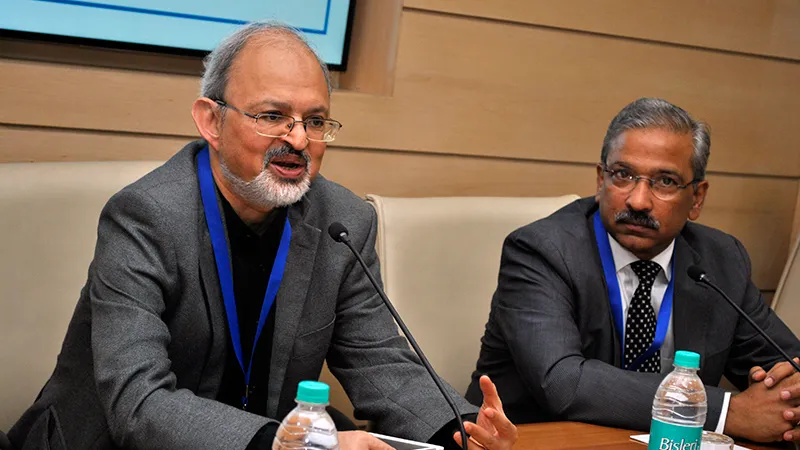-
CENTRES
Progammes & Centres
Location

Experts have suggested setting up smart fencing and biometric and digital profiling of people at border regions to ensure better management of the borders at the BBIN (Bangladesh, Bhutan, India and Nepal) region.
Participating in the day-long international conference on ‘Smart Border Initiative’ organised by Observer Research Foundation on March 4, the experts, among many recommendations, also stressed the need for strengthening cooperation on border management among South Asian countries to enhance connectivity in the region.
The conference discussed challenges of border management and ways for cooperation with special emphasis on BBIN countries (Bangladesh, Bhutan, India and Nepal).
Besides participants from the BBIN countries, there were speakers from the Embassy of United States of America and the European Union Representative Office in New Delhi. The conference had three sessions. The major themes of these sessions were: i) Cross-border movement of people & goods: Minimising risks; ii) Radicalisation & extremism; iii) Towards a viable solution – Boosting border infrastructure & technology.
Mr Sunjoy Joshi, Director of ORF, delivered the opening address. Mr Mahendra Kumawat, Distinguished Visitor, ORF and a former Director General of the Border Security Force (BSF) gave the concluding remarks.
Kick-starting the conference, Mr Joshi highlighted the unique nature of the border among the BBIN countries. India has open borders with Nepal and Bhutan while have closed borders with Bangladesh. He further observed that technology has now afforded us better opportunities for border management between nations.
In the first session, emphasis was given on addressing issues concerning cross-border movement of people and goods. It discussed ways to minimise risks. It discussed in detail about the security implications of cross-border illicit activities and human migration. Besides, discussions pointed to the extent of religious militant groups involved in the trans-border criminal networks; sources of funding for the terror groups; how these movements’ impact legitimate trans-border activities and steps to deal with such challenges. Distinguished speakers in this session were Mr A P Maheswari (Additional Director General of Border Security Force), Mr Sudhir Vyas (former Indian Ambassador to Bhutan), Mr Buddhi Narayan Sreshta (Managing Director of Bahumichitra Mapping Land Development Company, Nepal) and Mr P K Mishra (Senior Fellow, Vivekananda International Foundation, Delhi. In the absence of Shahedul Anam Khan (Strategic Affairs Editor, The Daily Star, Bangladesh) his paper was read out by Air Cdre Ishfaq llahi Choudhury (Treasurer at the University of Asia Pacific, Dhaka). Ms Jyoti Malhotra (Senior Journalist) chaired the session.
The second session, which focussed on the challenges facing the region from the radicalisation and extremism, shed light on the various violent groups emerging in the BBIN region and the possible impact of the US drawdown from Afghanistan in the region. The session also discussed the issue of cross-border linkages among the various regional militant groups and preparedness of the countries to deal with them. The session also looked for ways to foster greater cooperation among the nations to meet this challenge. The speakers in the session were Air Cdre Ishfaq llahi Choudhury, Dr Nischal Pandey (Director, the Centre for South Asian Studies, Nepal), Maj Gen Munirruzzaman (President, the Bangladesh Institute of Peace and Security Studies), Mr. Ratnadeep Choudhury (Northeast Correspondent, Deccan Herald) and Dr Joyeeta Bhattacharjee (Fellow, Observer Research Foundation). The session was chaired by Mr. Rajeet Mitter (former Indian High Commissioner to Bangladesh).
The third session focused on issues regarding boosting the border infrastructure and the role of technology. It discussed steps necessary for improving the border infrastructure to deal with the cross border challenges more effectively. It was pointed the need to upgrade technology to enhance cooperation on the border management. It was also emphasised that such technologies should be made cost effective. The session also looked into the nature of border management cooperation initiatives in the European Union and the United States as lessons to frame future cooperation in the region. The speakers in this session were Mr. Wojciech Dziworski (Consular, EU Delegation, Delhi), Mr. Stephen Goldrup (CT Coordinator for South Asia, US Embassy, Delhi), Maj Gen Umong Sethi (Co-Chair of the sub–committee of ‘Surveillance and Security Systems’ of Electronic Sector Skill Council of India), Mr. RK Singh (Managing Director, General Dynamics Satcom Asia Pvt Ltd) and Mr. Devdan Mitra (Senior Editor, The Telegraph, Kolkata). This session was chaired by Ms Shebonti Dadwal (Research Fellow, IDSA).
The following are some of the recommendation made in the conference for effective border management in the BBIN region.
This report is prepared by Dr. Joyeeta Bhattacharjee, Fellow, Observer Research Foundation, New Delhi, with inputs from researchers Harish Venugopalan, Kriti Shah and Sabah Ishtiaq.
The views expressed above belong to the author(s). ORF research and analyses now available on Telegram! Click here to access our curated content — blogs, longforms and interviews.